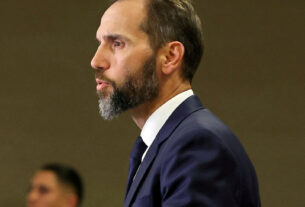Remember last month, when you didn’t have to think twice about the safety of America’s nuclear arsenal? Or how about last year, when you could file your taxes without wondering if the I.R.S. might share your Social Security number and banking details with an unvetted contractor? Those were the days.
In the weeks since President Trump unleashed Elon Musk’s initiative, the Department of Government Efficiency, on our federal institutions, it has profoundly destabilized basic systems we count on to make our society function. Two weeks ago, Senator Ron Wyden announced that DOGE agents had gained access to the I.R.S. and “are in a position to dig through a trove of data about every taxpayer in America,” raising concerns about privacy and delayed refunds.
In early February, Mr. Trump suggested the DOGE team — many of whom are younger than the typical age required to rent a car — should staff air-traffic-control towers in lieu of the trained experts he claimed were “intellectually deficient.” His proposal seems unlikely to reassure Americans spooked by the spate of airline collisions and fatal crashes that have occurred since Inauguration Day, following years of warnings about inadequate aviation safety. A poll released last week shows that Americans’ confidence in the federal government to ensure aviation safety has already dropped by 11 percent since last year.
It’s as though the current administration is running Franklin Roosevelt’s first 100 days in reverse: Instead of rebuilding institutions and public trust at a moment of national peril, it seems to be trying to unravel both — and is creating a moment of national peril.
This threatens to destroy what’s left of Americans’ faith in government. Moving fast and breaking things — the Silicon Valley motto that appears to inspire Mr. Musk and his DOGE initiative — is “potentially wreaking havoc,” as Senator Ed Markey and Representative Don Beyer recently wrote, on federal systems that ensure our physical and economic survival.
Those systems include the National Nuclear Security Administration: specialists who build and maintain the country’s nuclear stockpile. As many as 300 staff members were summarily fired earlier this month by DOGE officials who reportedly “did not seem to know this agency oversees America’s nuclear weapons” (some were reportedly asked to return to work). Worse yet, in its chaotic backtracking, the administration is now having trouble rehiring some of these specialists because it cannot find their contact information.
Even if all those nuclear specialists could be located, why would they consent to return now that Mr. Musk and DOGE have demonstrated their willingness to use federal authority as an instrument of capricious, arbitrary destruction?
This promises to be a tough way for Americans to learn a critical fact too often overlooked — that one of our country’s greatest and least-appreciated assets has been public faith and trust in a variety of highly complex systems staffed by experts whose names we’ll never know. In fact, high levels of trust used to be one of our superpowers in the United States: specifically, that meant trust in our government to operate with reasonable competence and stability, and without the kind of corruption that has hobbled other societies.
The key national asset was trust in the system overall, rather than in any individual or elected official. For decades, academics and polling companies have measured this with the question “How much of the time do you think you can trust the government in Washington to do what is right?”
Though that trust declined significantly as a result of the Vietnam War, it remained high enough that our country could regain stability and prosper after crises like the Covid pandemic, from which our peer nations struggled to recover. This was driven in part by faith in the competence and integrity of our civil service and federal institutions.
That is what is now at risk. Just before Mr. Trump took office the first time in 2017, Transparency International ranked the United States among the top 20 countries in the world for least corrupt government. Now the United States has plunged in those rankings to its lowest level ever. We now have the same ranking as the Bahamas, an offshore financial center rocked by recurrent fraud and corruption scandals (like the 2022 collapse of the FTX cryptocurrency exchange).
Trust in government to do what is right, at least most of the time, is a form of wealth — call it civic capital — that breeds prosperity on many fronts. Anything that threatens that trust weakens our society and economy.
DOGE, with Mr. Musk’s leadership and the blessing of the Trump administration, seems determined to violate public trust on an unprecedented scale. The organization still operates with no clear legal authority to make the sweeping budgetary and personnel changes it is carrying out. Federal courts in Maryland, New York and Washington, D.C., are hearing lawsuits challenging DOGE as an unconstitutional “threat to democracy.”
Of course not all Americans think the disruptions from the Trump administration are creating distrust. He was elected to make changes, they say, and at least he is actually doing something. The White House itself argues that slashing the size of the federal government could yield major economic benefits.
Yet there is growing evidence that Americans doubt Mr. Trump’s leadership. In several polls, his approval ratings — which began at a high level for him but at a low level historically for a president just elected to office — have slipped. Another poll suggests that his administration’s priorities are misplaced, particularly in not doing enough to fight inflation. And perhaps above all, in recent weeks, as Republican lawmakers fan out across the country to face their constituents in town halls, they have been confronted by a barrage of fear and even fury at what the president is doing in Washington.
What’s more, the Musk initiative is raising the potential for long-term damage to vital government statistics: that is, to our public information infrastructure. DOGE staff members — whose names, titles and salaries the organization still refuses to release — have been granted access to vast data sets (like those of the Department of Labor) whose integrity is critical not only to the public but also to maintaining the web of trust linking federal agencies to one another. As the economics and technology journalist Lizzie O’Leary writes, “confidence in government statistics is a precious commodity.”
The same can be said of all forms of public confidence in government. Trust is the glue holding together our nearly 250-year-old democracy. But once it is lost for many Americans, trust is exceedingly difficult to win back.





